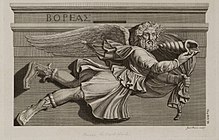
A north wind originates in the north and blows in a southward direction. The wind has had historical and literary significance, since it often signals cold weather and seasonal change in the Northern hemisphere.
Mythology
- In Greek mythology, Boreas was the god of the north wind who gains his ends by force – except in Aesop's fable of The North Wind and the Sun.
- In Roman mythology the north wind was represented by Aquilon.
- In Egyptian mythology, Qebui is the god of the north winds.
- In Inuit mythology, Negafook represents "the North wind" or, more eloquently, "the spirit that likes cold and stormy weather".
See also
References
- Encyclopaedia Britannica (1893), Vol. 4, p.53
- J. Paul Getty Trust iconography record
- Hall, Adelaide S. (2005). A Glossary of Important Symbols in Their Hebrew, Pagan & Christian Forms. Cosimo, Inc. p. 15.
- "North Wind Mask (Negakfok)". The Metropolitan Museum of Art. Retrieved 2014-03-15.